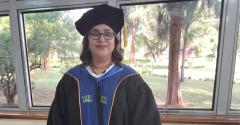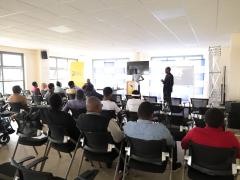Internal Audit
Internal auditing is an independent, objective assurance and consulting activity designed to add value and improve an organization’s operations. It helps an organization accomplish its objectives by bringing a systematic, disciplined approach to evaluate and improve the effectiveness of risk management, control, and governance processes.
Contribution of the USIU-Africa Internal Audit
USIU-Africa Internal Audit is a valuable resource to the University’s Management Board, University Council (through the Audit Committee) and other stakeholders in helping them discharge their responsibilities.
Responsibility
i. The USIU- Africa’s Internal Audit department is responsible for providing assurance on the effectiveness of risk management, control, and governance processes. It achieves this through objective assessments of the reliability of the University’s financial information, compliance with University policies and procedures, compliance with laws and regulations, the safeguarding of assets and the effectiveness and efficiency of operations.
ii. The department also provides consulting services within the University concerning issues related to internal controls, special investigations, and other areas of interest. Consulting activities are advisory in nature and are based on management requests, the nature and scope of which are agreed with the University’s Management Board, are intended to add value and improve the university’s governance, risk management, and control processes without the Internal audit department assuming management responsibility.
What unique value does the USIU-Africa Internal Audit provide to the University’s stakeholders;
i. Assurance; The Internal Audit provides assurance on the University’s governance, risk management, and control processes to help in the achievement of the strategic, operational, financial, and compliance objectives.
ii. Insight; Internal Audit is a catalyst for improving the University operations’ effectiveness and efficiency by providing insight and recommendations based on analyses and assessments of data and business processes.
iii. Objectivity; through upholding integrity and accountability, Internal Audit provides value to the University Council and Management Board as an independent source of objective advice.
Reporting Structure and Independence
In order to strengthen the independence of the Internal Audit function, the function has a dual reporting relationship. It reports functionally to the University Council’s Audit Committee and administratively to the Vice Chancellor. In addition, the University’s Internal Audit function remains free from interference by any element on matters including audit selection, scope, procedures, frequency, timing and report content.
The University’s Internal Audit function does not have direct operational responsibility or authority over any of the activities it audits. Accordingly, internal auditors will not implement internal controls, develop procedures, install systems, prepare records, or engage in any other activity that may impair the internal auditors’ judgment.
Authority
USIU-Africa Internal Audit department derives its mandate from its Charter as approved by the University Council through the Audit Committee. With requirement for strict confidentiality and safeguarding of records and information that comes to its procession, the Charter authorizes the USIU-Africa Internal Audit function to have full, free, and unrestricted access to any and all University information, documents, records, physical properties and personnel pertinent to carrying out any audit engagement.
Code of Ethics
USIU-Africa’s Internal Audit ascribes to The Code of Ethics as outlined in the Institute of Internal Auditors’ mandatory guidelines. This Code of Ethics provides the principles and expectations governing the behavior of individuals and organizations in the conduct of internal auditing.
The code of ethics includes two essential components; namely the principles and rules of conduct:
I. The Principles
These outlines the Principles that are relevant to the profession and practice of internal auditing.
a. Integrity
The integrity of internal auditors establishes trust and thus provides the basis for reliance on their judgment.
b. Objectivity
Internal auditors exhibit the highest level of professional objectivity in gathering, evaluating, and communicating information about the activity or process being examined. Internal auditors make a balanced assessment of all the relevant circumstances and are not unduly influenced by their own interests or by others in forming judgments.
c. Confidentiality
Internal auditors respect the value and ownership of information they receive and do not disclose information without appropriate authority unless there is a legal or professional obligation to do so.
d. Competency
Internal auditors apply the knowledge, skills, and experience needed in the performance of internal audit services.
II. Rules of Conduct
Outlines the behavior norms expected of Internal Auditors. These rules are an aid to interpreting the Principles into practical applications and are intended to guide the ethical conduct of internal auditors.
a. Integrity
Internal auditors:
i. Shall perform their work with honesty, diligence, and responsibility.
ii. Shall observe the law and make disclosures expected by the law and the profession.
iii. Shall not knowingly be a party to any illegal activity, or engage in acts that are discreditable to the profession of internal auditing or to the organization.
iv. Shall respect and contribute to the legitimate and ethical objectives of the organization.
b. Objectivity
Internal auditors:
i. Shall not participate in any activity or relationship that may impair or be presumed to impair their unbiased assessment. This participation includes those activities or relationships that may be in conflict with the interests of the organization.
ii. Shall not accept anything that may impair or be presumed to impair their professional judgment.
iii. Shall disclose all material facts known to them that, if not disclosed, may distort the reporting of activities under review.
c. Confidentiality
Internal auditors:
i. Shall be prudent in the use and protection of information acquired in the course of their duties.
ii. Shall not use information for any personal gain or in any manner that would be contrary to the law or detrimental to the legitimate and ethical objectives of the organization.
d. Competency
Internal auditors:
i. Shall engage only in those services for which they have the necessary knowledge, skills, and experience.
ii. Shall perform internal audit services in accordance with the International Standards for the Professional Practice of Internal Auditing.
iii. Shall continually improve their proficiency and the effectiveness and quality of their services.
Staff Contacts:
Stephen Ndegwa Njagi
Chief Internal Auditor
Email: snnjagi@usiu.ac.ke
Office: +254 730 116 347
Bryon Amanya
Senior Internal Auditor
Email: bamanya@usiu.ac.ke
Office: +254 730 116 104






